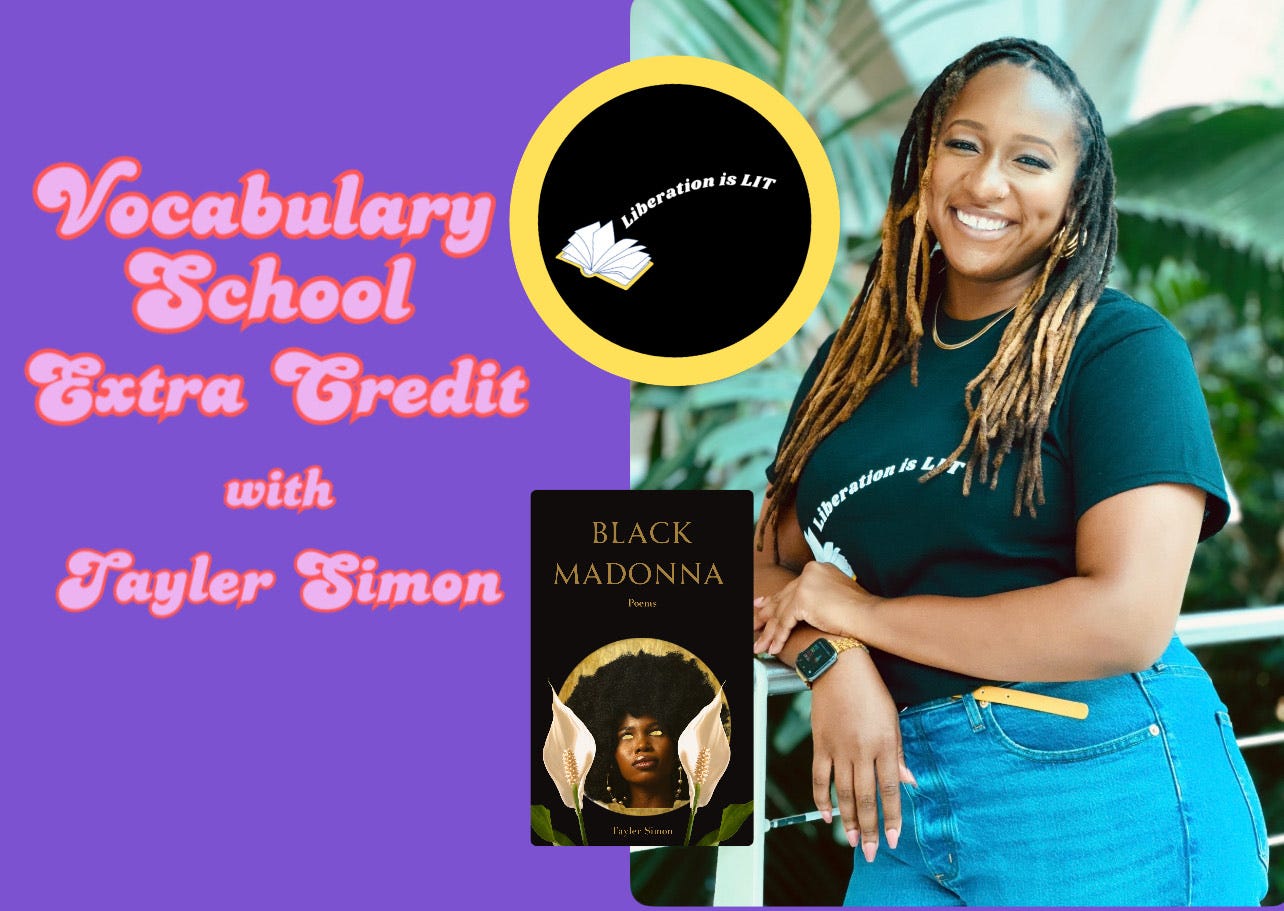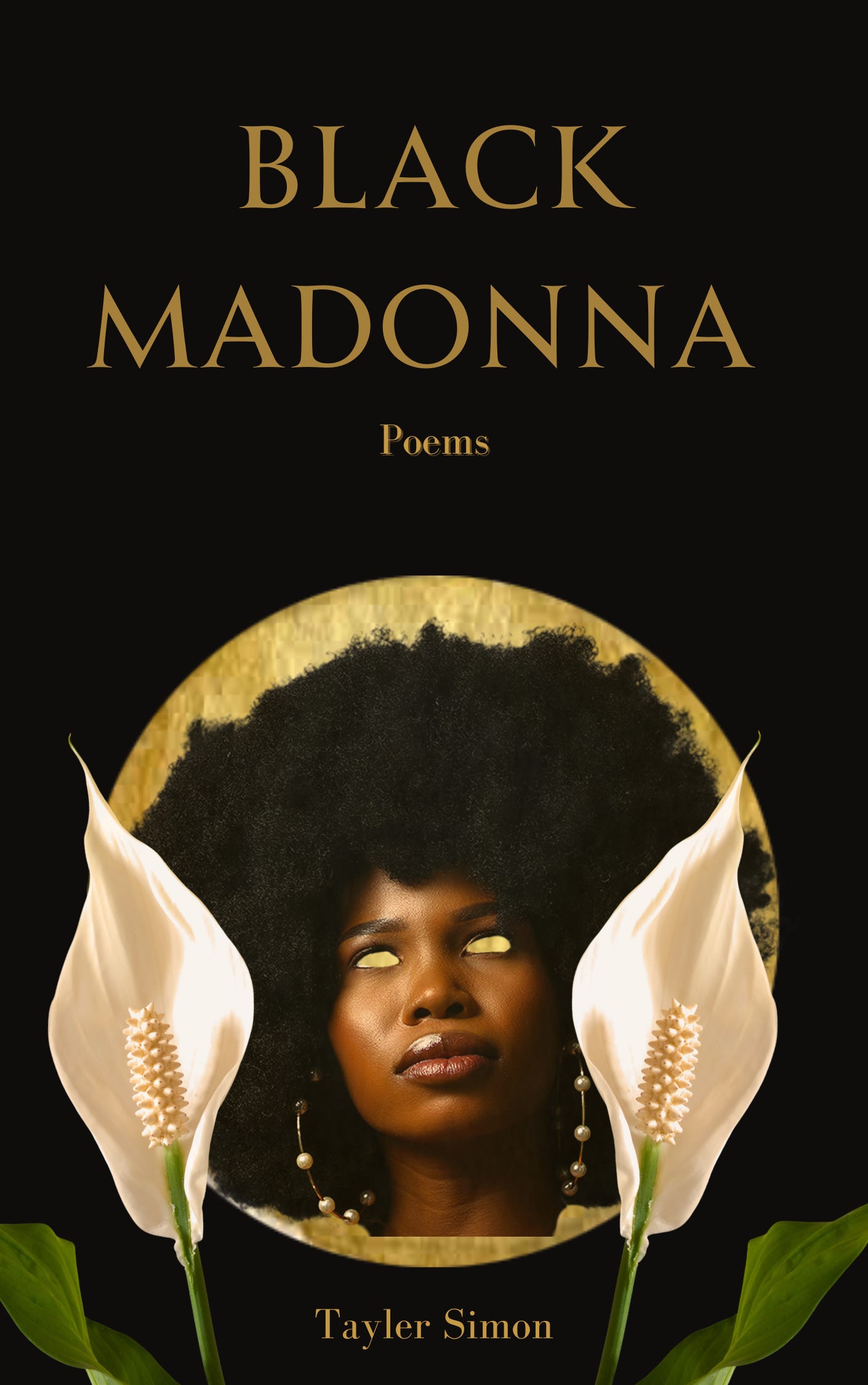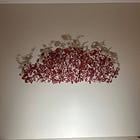Extra Credit with Tayler Simon
Black Madonna by Tayler Simon
Last month, Jessica shared “Timely” by Tayler Simon’s Black Madonna with me in order to examine the word “temerity” and contemplate its prescience in our current climate. I took a swing and emailed the poet and activist as I worked on that particular newsletter and she agreed to email with me about her vocabulary life and word usage. Every time Tayler responded to an email, I was so excited to read what she had to say which is the only case of being excited by an email in recorded history. In our emails, she discusses being an early advanced reader who was encouraged to seek her own answers, words she loves to use because she finds them delicious, and the important work she does as a bookseller whose business focuses on liberation for all. Since reading her answers, I’ve had the opportunity to read her poetry collection, Black Madonna, which is a tender examination of what it means to be a young Black woman in a world that attempts at every turn to suppress and oppress your being. One section of the collection, “Blackout” features her own statements at local school board meetings blacked out for maximum impact. Her poems reckon with caring for community as well as the individual as we collectively struggle against fascism and toward the liberation of all.
Check out
on Substack and support the important work she’s doing with Liberation is Lit. Her creativity and incisiveness is not to be missed! Please enjoy our email chat!Do you think you have a good vocabulary?
I think I have a better vocabulary than many people, although I am still looking to build my vocabulary. As a poet, I am constantly on the hunt for better words to encompass feelings as clearly as I can. I also love playing with the sounds of words.
Is a good vocabulary necessary to be a good writer?
I agree! Sometimes we need a wide variety of words to clearly articulate a feeling or story or message. If we limit our vocabulary, we limit our expression. I don’t think it’s a matter of trying to sound smarter than you are, although I think many writers do this, especially within academia. Rather, I think having a good vocabulary can expand your creativity as a writer.
Do you think that vocabulary building can be a creativity exercise?
I really think so! I am usually not one to have the best time in the revision process, but it is the most fun trying to find the best word to encapsulate a feeling. For example, we always use the word good to describe food, but what if we meant scrumptious or delectable?
What do you remember about learning new words as a kid?
I got a dictionary as a Christmas present one year, and while I didn’t read it cover to cover, I used it all the time! I was an avid reader at a very young age, and often read above my grade level, so most of the vocabulary words I learned was looking up unfamiliar words. I still do this to this day! Just don’t ask me how to pronounce them!
I was always looking up words because the adults in my life always encouraged me to find answers for myself instead of relying on them to tell me what was right or wrong. It instilled in me curiosity for many things outside of vocabulary. I can’t remember the books I read in later elementary school, but in early elementary school I was reading Nancy Drew and by the time I go to middle school, I was reading books like Flowers in the Attic and The Hunchback of Notre Dame. And Ellen Hopkins was my favorite author by eighth grade. In addition to the things I was reading, I loved being a part of adult conversations. I never contributed because I didn’t want them to realize I was there and send me away to play by myself (I was in a weird sandwich generation with no cousins my age). I was very mature for my age, but I still feel very child-like sometimes!
What is your practice when you encounter an unfamiliar word while reading?
When I’m reading books, I always highlight words I’m unfamiliar with and write their meaning in the margins. I love book annotations.
Which three words would you use to describe your writing life?
Delicious because I always try to use words that taste good in my mouth.
Liberatory because I am always trying to write myself free.
Curious because I am always seeking to find out more about myself and the world through my writing.
I love this! What words taste good?
Separate from denotation, I love how words like jealousy and gentle and teakwood. I think the most delicious words make me feel my tongue in my mouth.
What word were you excited to be able to use in your current work and why was it an important choice?
I am always excited to use the word liberation in my work. Social Justice never felt quite right because it felt like justice implied a winner or loser. Liberty felt too close to an ideal that didn’t mean freedom for all people. But liberation felt most aligned with the work I do.
I’d love if you could talk about the work you do with Liberation is Lit.
Liberation is Lit is a pop-up and online bookstore that aims to spark collective action for liberation and community building among readers and book lovers by promoting stories from intersectional experiences. We are not just a bookstore but a reimagining of how storytelling in all its forms from the most marginalized in our society can be a practice of liberation for us all. Liberation is Lit serves readers, writers, artists, and activists looking for connection around storytelling and liberation work. In addition to selling books, we frequently give free books to community, share updates on policies and political actions, collaborate on community arts initiatives like poetry competitions and anthologies, and facilitates a LibeRATED YA book club.
What word do you wish more people used? What word do you wish to never hear again?
I wish people used the word liberation more often because of the reasons why I listed above. I hope to never hear the word indoctrination again because I feel like it has been weaponized against any forms of critical thinking.
What word keeps you going when writing feels impossible?
The word devotion keeps me going when writing feels impossible. One of my favorite activists, Mariame Kaba, says hope is a discipline, but the word discipline has always felt too rigid for me, but I loved this idea. But then Mia Birdsong said in a workshop I attended that devotion is a better alternative to discipline because it implies that we are committed out of love and not obligation. My new phrase is “hope is a devotion.” I apply my devotion to writing because it is a thing I love, a tool I want to use to change the world, and something that helps me always come back to myself.
Thank you so much to Tayler for providing such thoughtful and inspiring responses!
Black Madonna is now available for purchase. Make your local library pick up a copy while you’re at it!
Check out the Vocabulary School where I examine the usage of “temerity” from Tayler Simon’s “Timely” from Black Madonna.






I’m so glad you two could connect and bring us the importance of liberation and devotion.